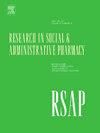Psychometric properties of the multifactor leadership questionnaire when used in early-career pharmacists with provisional registration
IF 3.7
3区 医学
Q1 PUBLIC, ENVIRONMENTAL & OCCUPATIONAL HEALTH
Research in Social & Administrative Pharmacy
Pub Date : 2024-10-10
DOI:10.1016/j.sapharm.2024.10.004
引用次数: 0
Abstract
Background
The Multifactor Leadership Questionnaire (MLQ) is a validated instrument used to explore participants' perceptions of leadership and the Outcomes of leadership, participants' evaluation of and satisfaction with leadership and willingness to put in extra effort. The factor structure of MLQ varies across studies. The aim was to explore the psychometric properties of the MLQ for early-career pharmacists rating their preceptor's leadership.
Methods
The MLQ was administered to provisionally registered pharmacists during the final half of their 1 year of supervised practice. Confirmatory and Exploratory Factor Analysis (CFA & EFA) and Structural Equation Modeling (SEM) were used to analyse the data.
Results
Responses were obtained from 430 participants (25 % of all Australian pre-registration pharmacists at the time). CFA demonstrated that the original 9-factor model and a range of previously published models were poor fit for the data. EFA revealed that a good fit was a model with 4 factors named: Passive laissez-faire, Strategic visionary, Personalized, and Active management by exception. Passive laissez-faire and Active management by exception were consistent with previously published models. The Strategic visionary and Personalized factors were interpreted as 2 forms of transformational leadership that includes the provision of rewards depending on performance. A SEM of MLQ sub-scales predicting Outcomes of leadership explained 90.3 % of variance. Personalized leadership was highly predictive (β = 0.743, P < 0.001) while the three other factors had negligible effects.
Conclusion
The psychometric analyses demonstrated overlap of the original 9-factors. A more parsimonious 4-factor model fit the data well.
多因素领导力调查问卷用于临时注册的早期职业药剂师时的心理计量特性。
背景:多因素领导力问卷(MLQ多因素领导力问卷(MLQ)是一个经过验证的工具,用于探究参与者对领导力和领导力成果的看法、参与者对领导力的评价和满意度以及付出额外努力的意愿。在不同的研究中,MLQ 的因子结构各不相同。我们的目的是探索 MLQ 的心理测量特性,以帮助早期职业药剂师对其实习导师的领导力进行评分:方法:在临时注册药剂师 1 年指导实践的最后半年,对他们进行 MLQ 测试。数据分析采用了确认性和探索性因子分析(CFA & EFA)以及结构方程模型(SEM):430 名参与者(占当时澳大利亚注册前药剂师总数的 25%)做出了回答。结构方程分析表明,最初的 9 因子模型和一系列以前公布的模型与数据的拟合度较低。EFA 显示,4 个因子模型的拟合效果较好:被动自由放任、战略远见、个性化和主动例外管理。被动自由放任和例外情况下的主动管理与之前公布的模型一致。战略远见型和个性化因素被解释为两种形式的变革型领导,包括根据绩效提供奖励。预测领导力结果的 MLQ 子量表的 SEM 解释了 90.3% 的方差。个性化领导力具有很高的预测性(β = 0.743,P 结论):心理测量分析表明,原有的 9 个因子存在重叠。一个更为简洁的 4 因子模型能够很好地匹配数据。
本文章由计算机程序翻译,如有差异,请以英文原文为准。
求助全文
约1分钟内获得全文
求助全文
来源期刊

Research in Social & Administrative Pharmacy
PUBLIC, ENVIRONMENTAL & OCCUPATIONAL HEALTH-
CiteScore
7.20
自引率
10.30%
发文量
225
审稿时长
47 days
期刊介绍:
Research in Social and Administrative Pharmacy (RSAP) is a quarterly publication featuring original scientific reports and comprehensive review articles in the social and administrative pharmaceutical sciences. Topics of interest include outcomes evaluation of products, programs, or services; pharmacoepidemiology; medication adherence; direct-to-consumer advertising of prescription medications; disease state management; health systems reform; drug marketing; medication distribution systems such as e-prescribing; web-based pharmaceutical/medical services; drug commerce and re-importation; and health professions workforce issues.
 求助内容:
求助内容: 应助结果提醒方式:
应助结果提醒方式:


